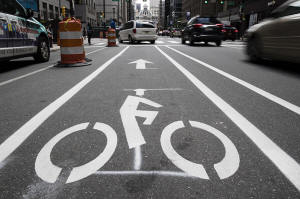States push to shift road funds to transit and bike projects as Trump
threatens cuts
[March 22, 2025]
By JEFF McMURRAY
CHICAGO (AP) — Hundreds of bicycle advocates were at an annual summit
this month in Washington, D.C., when their cellphones lit up over
breakfast with an urgent email warning that President Donald Trump's
transportation department had just halted federal grant funding for bike
lanes.
As the administration targets green energy projects championed by former
President Joe Biden that boosted transit, recreational trails and
bicycle infrastructure, several states are banding together to advance
those priorities on their own.
California, Illinois, Maryland, Michigan, Minnesota, New York and
Pennsylvania joined forces for a national organizing effort dubbed the
Clean Rides Network. The group gained momentum in various statehouses
this year on environmentally friendly transportation projects it
contends the federal government has abandoned.
“These are changes we need to make anyway, but they’re more urgent than
ever,” said Justin Balik, senior state program director for the
environmental advocacy group Evergreen Action and one of the organizers
of the Clean Rides Network. “I’ve been calling the state departments of
transportation the next frontier of climate advocacy.”
Trading highway expansion for buses
Although Colorado wasn't among the seven charter members of the Clean
Rides Network, a policy enacted there set the framework for one of its
most ambitious goals.
In 2021, Gov. Jared Polis committed to a dramatic reduction in
Colorado's greenhouse gas emissions and employed a novel approach to
accelerate the timeline. Whenever the state's transportation department
commits money to a large-scale project that increases vehicle traffic
such as a new highway, it must also pursue a corresponding project to
offset the environmental harms.

Two major highway expansion projects were canceled because of the
policy, said Matt Frommer of the Southwest Energy Efficiency Project.
The group advocated for the change.
Colorado used the savings to expand an intercity bus service that has
soared in popularity for urban residents and tourists traveling to ski
resorts.
Polis' vision lined up with the multimodal transportation aims under the
$1.1 trillion bipartisan infrastructure law Biden signed that year. In
the final months of Biden's administration, the city of Denver won a
$150 million federal grant to build a rapid transit bus line along one
of its busiest corridors.
Frommer, a transportation and land use policy manager, said there are
fears that states will now have to pursue projects like that on their
own.
“If your state cares about climate change, you need to take the reins
and step up and direct your transportation funds to projects that are
going to reduce emissions," Frommer said. “We may not be able to rely on
the federal government to put that policy in place or to really help you
in many ways.”
Colorado's approach moves east
Minnesota followed Colorado's lead and adopted a similar rule to offset
greenhouse emissions. Other states that are part of the network are
pushing proposals this session.

[to top of second column]
|

A bicycle lane along Market Street in Philadelphia, on June 4,
2018. (AP Photo/Matt Rourke, File)

The Maryland House recently passed its version of the Colorado law,
and Senate sponsor Shelly Hettleman said she's cautiously optimistic
it will win final passage before lawmakers adjourn.
In trying to persuade her colleagues, Hettleman has focused less on
the environmental benefits than what she sees as economic ones. A
study commissioned by the Colorado transportation department
projected up to $40 billion in savings through improved air quality,
road safety and reduced traffic congestion, among other things.
Lawmakers in the Clean Rides states of Illinois and Massachusetts
have advanced similar proposals, but they've encountered resistance
from some business leaders and advocates for road construction.
“This is another ill-advised piece of legislation, not based upon
science, that will defer needed improvements to our crumbling
transportation infrastructure in Illinois," said Mike Sturino,
president and CEO of the Illinois Road and Transportation Builders
Association. “Commuters will have to wait for improvements to our
existing interstate system, as this bill would delay addressing
unsafe conditions on our roads and bridges.”
Is there any interest from red states?
Although most of the state leaders who have pushed alternative
transportation options have been Democrats, the Clean Rides Network
said more conservative states have shown interest in some of the
topics, too.
Just as Colorado's anticipated cost savings helped spur legislation
in Maryland, economic concerns continue to be foremost in the minds
of residents, with some studies showing that transportation ranks
second to housing in consumer costs.

“Forget about the cost of eggs. It’s never been more expensive to
drive a car,” said Miguel Moravec with the nonprofit climate think
tank RMI, which created a calculator to help states project the
money they could save through policies that reduce emissions.
Virginia employs a scale that scores potential transportation
projects based on factors such as safety, congestion relief, and
environmental impacts.
Utah launched an ambitious transit plan for the rapidly growing
state, while Montana implemented land use and zoning reforms that
made cities more walkable.
Muhammed Patel, senior transportation advocate for the Natural
Resources Defense Council in Chicago, said states are at least
rethinking some of their policy priorities.
“We do live luckily in a country where states have authority over
their own transportation systems,” Patel said. “There’s flexibility
innately built in.”
All contents © copyright 2025 Associated Press. All rights reserved |